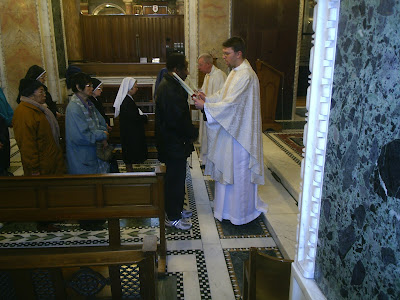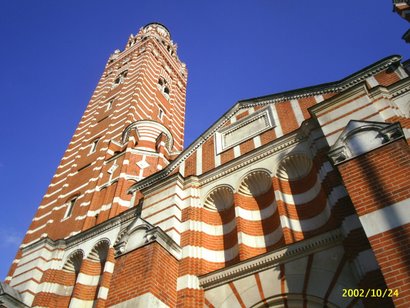A Clearing of the Throat

Blaise was a fourth century bishop, about whom little is known, but to whom attach several graphic tales. He used to bless animals and was famous for his healing powers - hence water blessed in his name is given to sick cattle. Bliase was eventually martyred by being torn with iron combs, and and accordingly the patron saint of wool combers. Most famously, however, he blessed a young child who was choking from a fish bone lodged in his throat. The boy recovered, and to this day the blessing of St Blaise for throats is given on his feast day.
 The images show Fr Slawek (happy birthday!) administering the blessing in the Lady Chapel after 8.00am Mass.
The images show Fr Slawek (happy birthday!) administering the blessing in the Lady Chapel after 8.00am Mass.Through the intercession of St Blaise
Bishop and Martyr
May you be preserved against diseases of the throat
and from every other infection;
in the name of the Father
and of the Son
and of the Holy Spirit.

6 comments:
I never failed to be moved by the 8am Mass... especially on Feasts such as this, when something very special happens at what is the beginnig of an ordinary day. Attending the Cathedral is a blessing that will remain with us long after regular participation ceases to be an option. Padre Pio said that the world could more easily survive without the sun than it could the Mass, and the witness of daily Eucharist, in all its different forms, at the Cathedral, is a living witness to that Truth.
We don't have this custom in Australia. I love tradition and would think of asking my priest (not a chance!) to introduce it but
what happens though when, inevetably, someone who had their throat blessed contracts throat cancer or something like that?
Sharon
You raise a good question that relates to all our prayers of intercession. In a blessing such as this we ask God to protect our throats, aware that all things are held in his hands and that - in his divine love - he may have other plans. That can be very difficult for us, and a great test of faith. However, Our Lord tells us repeatedly in the Gospels to ask for what we need; so our prayer of petition follows our heart's desire, and reminds us how dependent we are upon God's mercy, and how we are not self-sufficient.
In this case, St Blaise, standing by the Throne of God, adds his prayer to ours, asking God to bless our throats, but also expressing confidence in the loving plan of God (however difficult it may be for us, with our limited vision, to grasp this.
On a lighter note, I remember as a young child asking the Nuns who taught us why we still got sore throats after the blessing of St Blaise. "Ah now," they replied, "your sore throat would have been much worse if you hadn't had it done!"
Thank you so much for this reply; I have copied and pasted it.
I am living through a health difficulty at the moment and I felt so guilty asking that the cup pass from me and at the same time saying 'not my will but Thine be done' but really meaning please God heal me.
Please keep me in your prayers.
Thank you for your great blog. I've been an admirer of Westminster Cathedral for years.
Please could you post some information about any plans to permanently remove the front altar on the sanctuary? Were these just rumours a year or so ago? Is this altar "portable" and if so is Tridentine Mass only said at the old high altar?
Would be very happy to read some information about this topic as I have researched it to no avail.
I'll gladly do a posting on the sanctuary, and the issues it raises. Watch this space!
Post a Comment